Why all educators should revisit J. Krishnamurti
As the country’s education institutions begin to regain post-pandemic momentum in a fractious era of religious and communal discord while suffering ravages of climate change, government and private educators would do well to revisit the education philosophy and teachings of this extraordinary visionary sage J. Krishnamurti, writes Dilip Thakore

JK addressing a congregation in Vasant Vihar, Chennai (1986)
The 127th birth anniversary of philosopher, seer and educationist J. Krishnamurti (1895-1986) came and went on May 11 with muted, if any, celebrations. Even on the tranquil, verdant six-acre Vasant Vihar campus of the Krishnamurti Foundation India (KFI) in Chennai, and presumably in Krishnamurti foundations established in Britain, USA and Spain.
Nor was the birth anniversary of this visionary sage celebrated in any of the six centres and high-ranked primary-secondary schools with an aggregate enrolment of 2,000 students mentored by 270 highly qualified teachers established by KFI countrywide. That’s because during his long life span in which he delivered public discourses, engaged in discussions with teachers, students, Vedantists, Buddhists and other religious seekers, and gave press and radio interviews and his own writings which were edited and compressed into 80 books and 17-volumes covering philosophy, education and art of living, JK (as he was popularly known) repeatedly emphasised that the message rather than the messenger was important.
“What is said, is important, not the person. It is like if you have a telephone, you don’t give importance to it, you keep it clean, but what is said through the telephone becomes all important. Similarly, the person who is speaking here is not at all important. I would like to point this out over and over again,” said Krishanmurti, who during his lifetime consistently discouraged ardent followers to raise him to the status of a guru or cult figure.
The trustees of the Krishnamurti Foundation India (regstd.1928) have assiduously respected the philosopher’s wish. Although KFI’s arboreal Vasant Vihar campus sited in Chennai’s upscale Adyar suburb hosts the administrative office of KFI-cum-study centre where JK delivered discourses on education, living and spiritualism for over half a century, a book shop and JK’s carefully preserved bedroom sporting sepia photographs, statues and sculptures in his form and shape are conspicuously absent. A single rock formation in the central garden marks the spot where Krishnamurti delivered discourses for over half a century.
“The prime objectives of KFI are dissemination of JK’s teachings to the general public; acquiring, preserving and publishing his works and materials relating to life, education and research; rural upliftment activities including education, village health and livelihood programmes; promoting afforestation, water conservation and eco-friendly practices, and conducting cultural and humanitarian programmes in the light of Krishnamurti’s teachings. We practice what he preached in our six study centres which include five co-ed boarding schools and a day school in Chennai. Essentially, JK believed that children need holistic education, defined as continuous development of the intellect and preparation for transforming into good human beings living orderly lives in harmony with people and nature. This is his teaching that we are striving to keep alive through the foundation, our schools and study centres,” says Vishwanath Alluri, a former chartered accountant-turned-serial technopreneur (IMI Mobile Plc and IMI Software Pvt. Ltd). In 1995, Alluri experienced an epiphany during a visit to KFI’s Rishi Valley School and was deeply impacted by JK’s education philosophy and teachings. In 2014, he profitably exited his businesses and committed himself to propagating Krishnamurti’s “harmonious nation-building education philosophy”. In 2021, Alluri was appointed trustee-secretary of KFI.
The KFI trustees have been fairly successful in keeping JK’s teachings and legacy alive during the past 36 years since he passed away. KFI’s Chennai campus is open to visitors from 9.30 am to 5.30 pm (Tuesday-Sunday) for studying JK’s published works and viewing video talks delivered on myriad subjects and receives 300 footfalls per week.
[userpro_private restrict_to_roles=
Moreover, Krishnamurti’s percipient education philosophy has been kept alive by KFI’s six schools, routinely ranked among the Top 10 countrywide in the authoritative annual EducationWorld India School Rankings (EWISR, estb.2007) and among the Top 3 in their host states. And despite this seer’s insistence on propagating his message rather than persona, JK has attained guru status within India’s educated upper middle class. Proof of his enduring iconic status within the educated middle class is that KFI’s pioneer Rishi Valley School promoted in the rural ambience of Madanapalle a small village in latter day Andhra Pradesh by JK himself, has been ranked India’s #1 co-ed boarding school for 15 of the past 16 years since the pathbreaking annual EWISR was instituted. In the one year (2014) that RVS wasn’t ranked #1, KFI’s Sahyadri School was numero uno.
Quite clearly, KFI schools are highly respected by SEC (socio-economic category) ‘A’ sample respondents who rate and rank the country’s most well-known schools for the annual EWISR which since it was initiated in 2007, has evolved into the world’s largest and most detailed schools ranking survey. Apart from RVS, Madanapalle, routinely ranked India’s #1 co-ed boarding school, KFI’s Rajghat Besant School, Varanasi is ranked among the Top 15 nationally and #1 in Uttar Pradesh (pop.215 million); Sahyadri School is ranked #1 in Maharashtra (112 million); The Valley School #2 in Karnataka (63 million); and KFI, Chennai is ranked #1 in Tamil Nadu (79 million). (Visit https://www.educationworld.in/ew-india-school-rankings-2021-22/ for 2021-22 parameter scores and rankings).
“There’s no doubt that within SEC ‘A’ households, KFI schools are held in high regard and have excellent reputation. However, it’s important to note that SEC ‘A’ respondents are a small minority within the general population. They tend to comprise well-educated, liberal-minded, high net worth parents. But with their excellent nation-building curriculums and best primary-secondary education pedagogies and practices, KFI schools deserve a higher public profile and greater K-12 influencer status than they have at present,” says Premchand Palety, promoter-CEO of the Delhi-based Centre for Forecasting & Research Pvt. Ltd (C fore, estb.2000) which has conducted the annual EWISR ab initio.
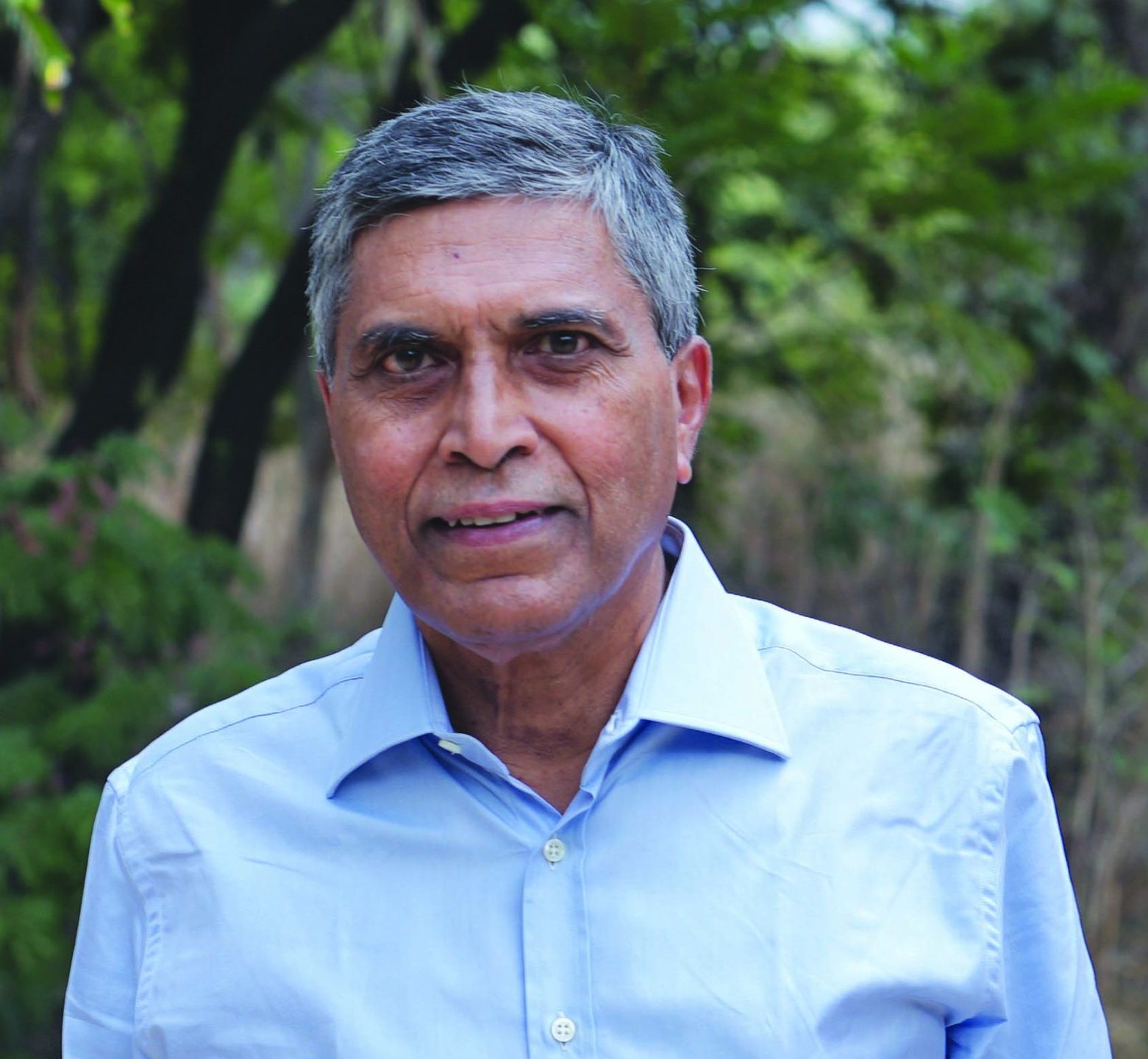
Vishwanath Alluri
The prime reason why Krishnamurti’s education philosophy which propagates inner growth, spiritual and moral development, social harmony and sustainable environment conservation practices hasn’t sufficiently influenced the country’s sub-standard primary-secondary education system is that hitherto the foundation and KFI schools in particular, have maintained a determined low public profile. Although the unprecedented EducationWorld India School Rankings Survey was launched in 2007, it was always difficult to persuade KFI trustees and leaders — perhaps because of unwarranted modesty — to share their success secrets with the academic community.
Only in recent years after EW’s bona fides as a missionary education reform publication were established that KFI school leaders have become more accessible to react to EWISR surveys, which routinely award them pride of place. Indeed to write this unprecedented long form story, your editor — a former practising barrister of the Bombay high court — had to marshal considerable advocacy resources to persuade KFI trustee-secretary Alluri to heed the biblical injunction to refrain from hiding the enlightening KFI lamp under a bushel, and share the schools’ exemplary practices with the wider educators’ community in the larger national interest in these troubled times when the education system seems to have lost its moral and ethical bearings. Fortunately, this argument was accepted.

Dr. Kumaraswamy (right)
The hesitation of the KFI top brass to raise their media profile is explained by Dr. A. Kumaraswamy, an alumnus of IIT-Madras and a former CSIR scientist who signed up in 1982 with the Rishi Valley Education Centre (RVEC), of which the top-ranked Rishi Valley School is a constituent unit. Although Kumaraswamy who has innovated alternative technologies including biogas and solar water heating systems, and solar power generators for rural development at RVEC, expresses admiration for the “unique methodology” of EWISR, he believes that RVS’ consistent top ranking presented the management with the problem of parents in India and abroad applying for admission of their children on the basis of its top rank, without “studying the school’s profile and philosophy carefully”.
“RVS has always discouraged competition, ranks and rewards. This has often deterred parents from certain sections of society from sending their children to study here. Unfortunately, our top rank in EW surveys has created the perception that we are an elite school despite our emphasis on simple living, care for the environment, and empathy for fellow human beings, rather than excellent sports facilities and infrastructure,” says Kumaraswamy, director of RVEC established by JK himself.
Evidently with religious and sectarian conflict on the rise, and incidents of man’s inhumanity to man multiplying even as the country is experiencing unprecedented industrial pollution, and environment damage due to global warming and climate change, the trustees of KFI have undergone a change of heart and mindset. They have become aware that the education philosophy and teachings of Krishnamurti — identified when he was an adolescent as a future World Teacher by English theosophists Charles Webster Leadbeater and Dr. Annie Besant (a founder of the Congress party which led India to freedom from the British Raj), but broke with them in 1929 — have the potential to heal the grievously wounded nation riven by sectarian discord and ravages of climate change and global warming.
KFI’s coming out is important because Krishnamurti who never professed, practised or preached any formal creed, expressed dissatisfaction with the ubiquitous factory-style, facts cramming primary-secondary education system which robbed children of the joys of childhood and learning through leisurely exploration and discovery. Moreover, he was perhaps the first educationist to foresee the consequences of the extractive and ecology destructive Western industrial development model, driven by unrestrained consumerism and the damage it would inflict upon Planet Earth’s environment and natural habitats.
In the early 1950s, JK described “present-day education as a complete failure, because it has over-emphasised technique”. In another lecture delivered in Ojai, California, he observed: “It is becoming more and more important in a world that is destructive that there should be a place, an oasis, where one can learn a way of living that is whole, sane and intelligent. Surely, school is a place where one learns about the wholeness of life. Academic excellence is absolutely necessary, but a school includes much more than that. It is a place where the teacher and taught explore not only the world of knowledge, but also their own behaviour. Freedom from conditioning begins with this awareness. It is only in such freedom that true learning can take place.”
Although revolutionary in the context of primary-secondary education in post-independence India where cramming, drilling and private tuitions have become normative for children from early childhood, Krishnamurti’s conceptualisation of schools as stress-free, joyous learning institutions wasn’t entirely novel. There is evidence that India’s ancient gurukuls were such institutions. Moreover, coterminously, the venerable British mathematician-philosopher Bertrand Russell (1872-1970) also propagated the benefits of joyful learning, and like JK promoted the alternative Beacon Hill School in 1927. However because of its ultra-liberal curriculum and lax discipline, Beacon Hill proved to be a failed experiment — unlike RVS, which has successfully implemented JK’s philosophy and precepts for almost a century — and was wound up in 1943. Moreover, Krishnamurti’s prescient advocacy and integration of love and respect for Nature and environment conservation into school curriculums differentiates him from other philosophers and seers.
“Whether we call ourselves communists or capitalists, Hindus or Buddhists, Muslims or Christians, whether we are blind, lame, or well and happy, this Earth is ours. It is our Earth, not somebody else’s; it is not only the rich man’s Earth, it does not belong exclusively to powerful rulers, to nobles of the land, but it is our Earth, yours and mine. We are nobodies, yet we also live on this Earth and we all have to live together. It is the world of the poor as well as of the rich, of the unlettered as well as of the learned; it is our world, and I think it is very important to feel this and to love the Earth, not just occasionally on a peaceful morning, but all the time,” said JK in 1964, a message that was a recurrent theme of his public lectures and voluminous writings.
A beneficial fallout of this education philosophy centred around joyful, stress free learning and Wordsworthian love of Nature and Mother Earth is that KFI schools, study and research centres across the country and abroad, have attracted highly learned educators and scholars committed to implementing JK’s education ideals in their classrooms and beyond. Therefore, a notable characteristic and feature of KFI schools is that their leaders and teachers genuinely believe that JK’s self-development and environment conservation prescription can save the world.

“Krishnamurti’s education philosophy and teachings have never been as relevant as they are today. Despite all the evidence adduced by eminent scientists researching climate change and environment destruction, people worldwide are not prepared to reduce excessive consumerism. Despite two World Wars and numerous lesser wars, violence is still used to settle disputes. The only hope seems to be education: working with young people not already burdened with old ideas and theories and free of over attachment to consumerism. This in turn requires educators interested in discovering the purpose of education and who aspire to discover goodness, simplicity and the beauty of life,” says Dr. Shailesh Shirali, a science and maths alum of Delhi University, IIM-Ahmedabad, University of Texas and former professor at the University of New Brunswick (Canada), former principal of the top-ranked Rishi Valley School (1992-2004) and currently director of KFI’s Sahyadri Education Centre and Sahyadri School, Pune.
The belief that Krishnamurti’s teachings about the purpose and ambit of education ideated several decades ago is even more relevant in this fractious day and age is pervasive within the extraordinarily qualified principals and leaders of KFI schools in India and abroad.
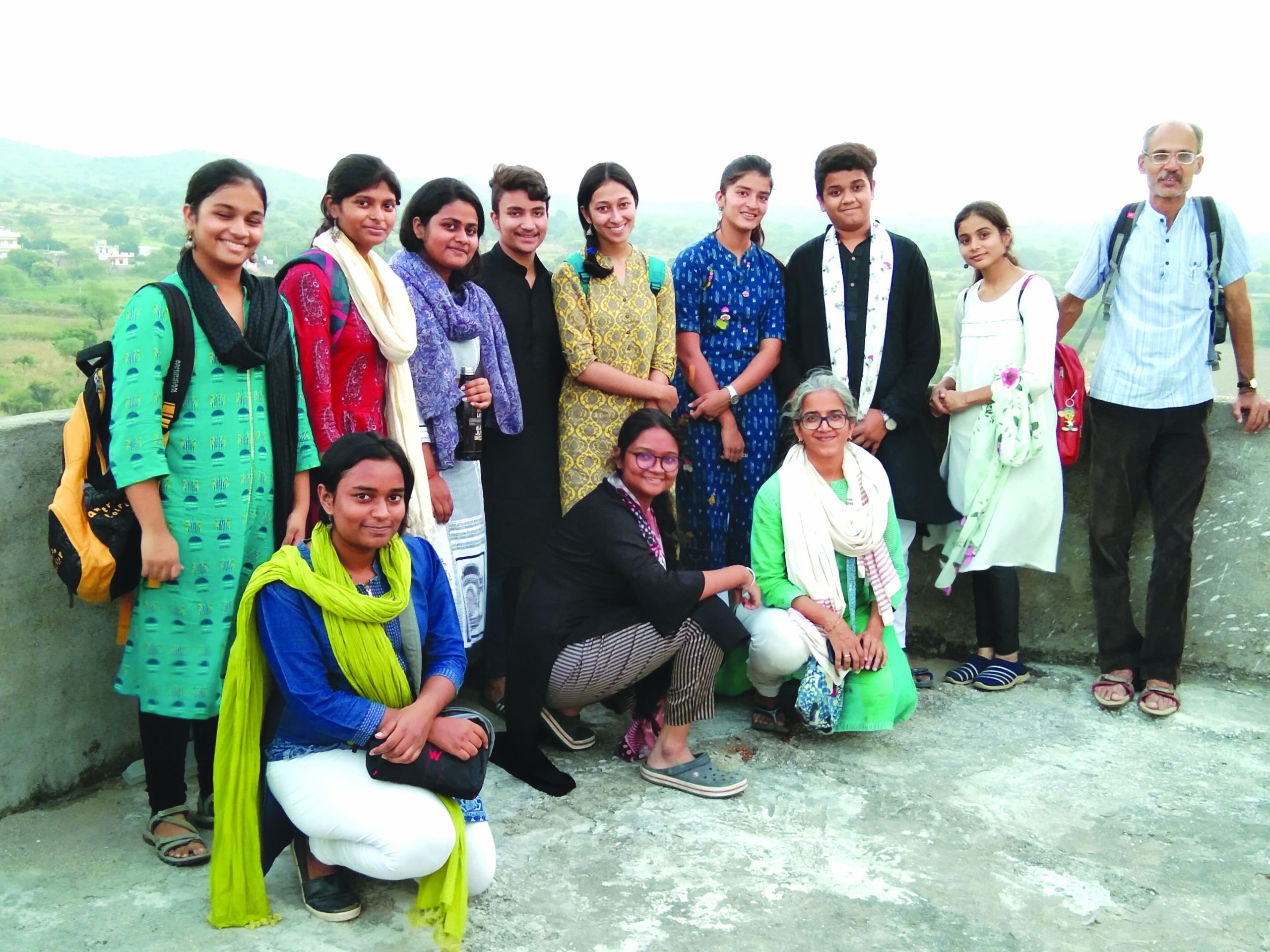
Siddharth Menon (right)
“JK’s message is relevant for all time because psychologically human beings have evolved insufficiently, if at all, and the roots of violence and conflict are still spreading worldwide. Their effect is perhaps becoming more pronounced in the new technologically evolved global society with no checks on rampant consumerism, and with the internet and social media being used to perpetuate social divisions. The ‘unexamined life’ as Socrates termed it, is capable of great mischief. Therefore, self-understanding — as opposed to self-absorption — is an urgent imperative, Krishnamurti discerned, which is why he promoted our schools,” says Siddharth Menon, a graduate of Delhi University and IGNOU, former principal of the top-ranked Rishi Valley School (2012-18) and currently a KFI trustee and director of the Rajghat Education Centre sprawled over 300 acres, hosting the Rajghat Besant Study Centre (estb.1932) which supervises the Rajghat Besant School, a rural school, study and research centre in Varanasi, Uttar Pradesh, India’s most populous state (215 million).
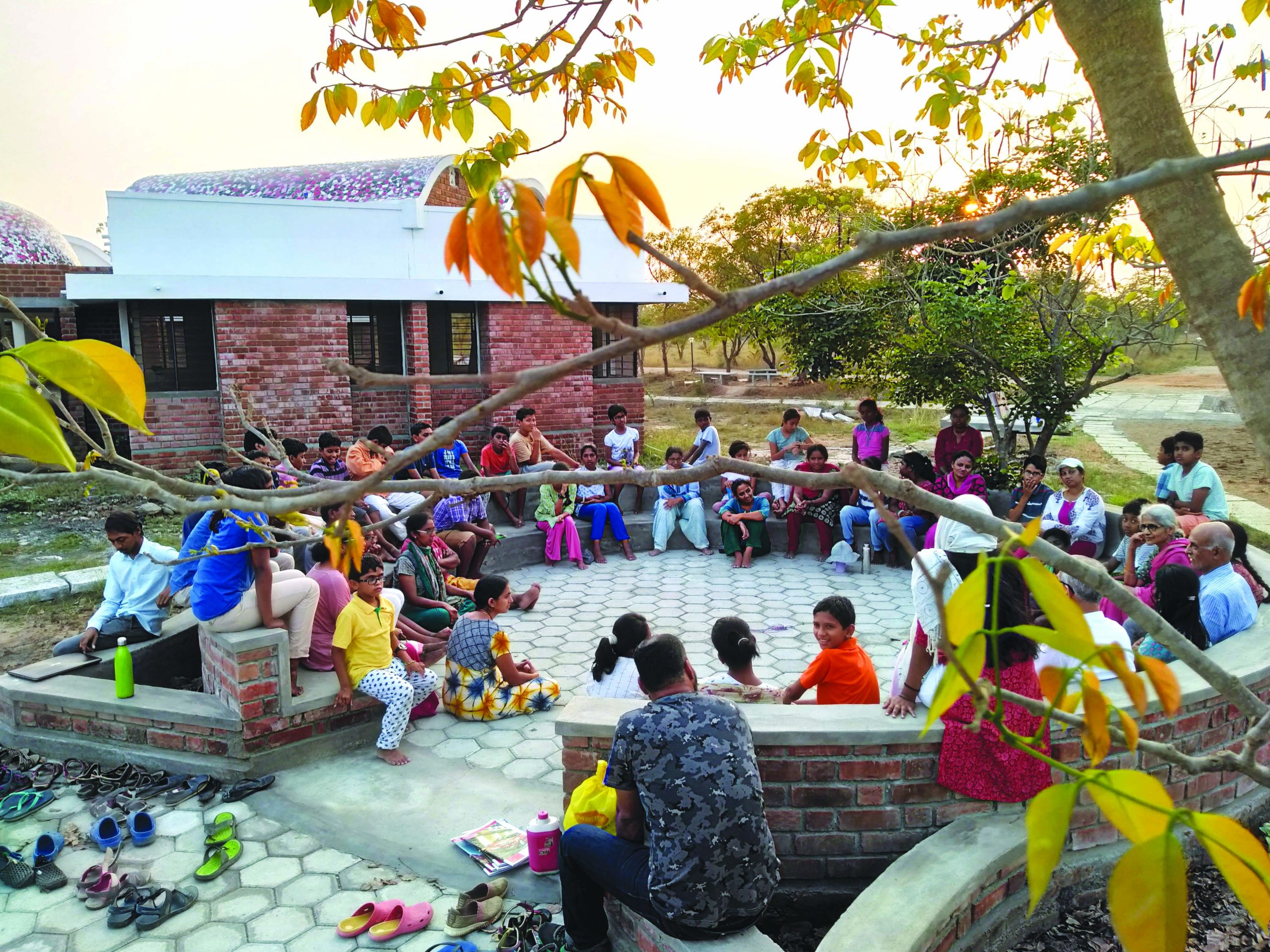
Students at KFI Palar Learning Centre
Although JK’s liberal and non-competitive education philosophy based on freeing young minds for exploratory and discovery learning is the common factor that binds all KFI education centres and six schools, JK’s recommended best practices have been implemented by development of robust, enabling structural architecture. According to M.G. Gautama, director of KFI’s Palar Learning Centre in Vallipuram, an hour’s drive from Chennai which also includes an Outreach & Study Centre and the K-12 CISCE and IGCSE (Cambridge, UK)-affiliated Pathashaala School (estb.2010), Krishnamurti advised that “each school must work out its own approach” within the broad philosophical framework of his teachings.
In compliance with this mandate, this relatively new 21st century school which has had the advantage of “learning from sister KFI schools and (contemporary) education thinking from around the world,” has devised a unique institutional culture. For instance, instead of traditional teachers and students/pupils, the “symmetrical nomenclature” is learner-educators and educator-learners so that “educators are learners as well”. Secondly, the school encourages multi-age students in classes, dining halls, cultural education and other forums; restricts the total number of campus residents to 150 (‘Dunbar’s Number’) to ensure individualised attention to students; implements sustainability practices (solar power, dry composting toilets, multiple learning spaces) and runs an elaborate year-round community outreach programme (kitchen gardens, flood relief, education support and other activities in neighbouring government schools).
“Krishnamurti emphasised the responsibility of every individual is to transform her consciousness, as it is the consciousness of humankind. This is the starting point from which real change can emanate,” says Gautama, an alumnus of IIT-Madras, former research scientist at the Bhabha Atomic Research Centre, Mumbai (1972-77) and project engineer with renowned engineering consultancy firm M.N. Dastur & Co (1977-83), who was appointed principal of The School, KFI in 1991. In 2012, Gautama was appointed director of KFI’s 21st century Palar Centre for Learning (estb.2010).
This emphasis on introspection/meditation and ‘knowing thyself’ as the precondition of joyful learning is a unique feature of KFI schools. “The need to understand oneself and the importance of relating with respect and affection towards human beings and nature, are perhaps the most significant learnings for us in this day and age,” says Jayashree Nambiar, an alumna of Madras University and Central University of Hyderabad and currently secretary of The School, KFI, Chennai (estb.1973), the sole day school of the foundation which has 380 students mentored by 38 teachers on its muster rolls.
Although Krishnamurti’s education philosophy was revolutionary and propagated a sharp turnaround from the facts cramming and regurgitation pedagogies of the 19th and 20th centuries, it was not entirely novel. Several 20th century educationists including Maria Montessori, Rudolf Steiner, and Bertrand Russell had propagated the virtues of introspection, self-discovery, and joyous learning with limited success.
However one facet of Krishnamurti’s education philosophy which differentiates him and establishes him as a visionary seer was his prescient advocacy of nature conservation and sustainable development in the early years of the 20th century. It is pertinent to recall that the post-World War II years experienced a consumerism boom unprecedented in global history. The earth’s resources — coal, oil, timber, iron ore and metals — were depleted with reckless abandon during several decades of unbridled industrial growth during which industry effluents polluted Planet Earth’s land, water and maritime resources and set in motion the climate crisis and ecological disasters the world is experiencing today.
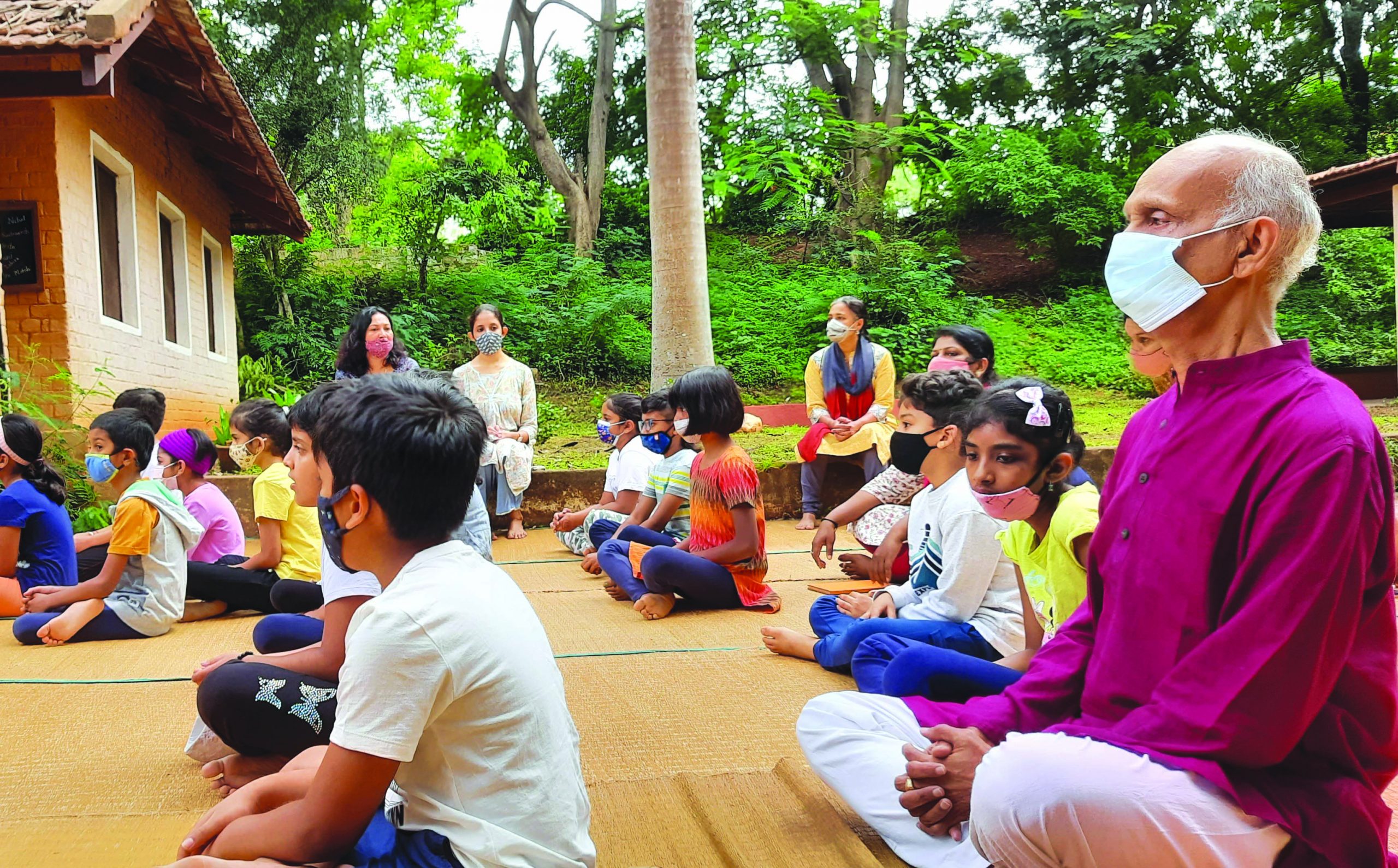
Dr. Jayaram Suryanarayan
In those decades of heady growth of consumption, JK was one of the few seers who propounded the ideal of simple living in harmony with nature and sensitivity towards the environment. As indeed was Mahatma Gandhi, who famously pronounced that the earth has sufficient resources for humankind’s “needs but not greed”.
Against this backdrop, arguably the greatest achievement of KFI trustees, school principals and teachers is that they have deeply embedded a new culture of environment consciousness and harmonious co-existence with nature in the curriculums of KFI schools. Almost all KFI study centres and schools were initially established on barren, fallow land sites in rural wildernesses for which there were few takers. But over the years, they were nurtured and greened by teachers and pupils into flourishing and sustainable environments of bio-diversity for clean and healthy living and learning.
According to Dr. Jayaram Suryanarayan, principal of KFI’s co-ed The Valley School, Bengaluru (TVS, estb.1978) for over a decade (2004-17), and currently director of the Bangalore Education Centre, KFI, ab initio the prime intent was to “educate students for life as well as nurture academic excellence”.
“In KFI schools and institutions, we are acutely conscious of dimensions beyond academics and share our deep concern for environment conservation and sustainable development with students. Therefore, the curriculum also focuses on bio-diversity protection, land-care, waste disposal, study of water bodies and other related issues. It’s noteworthy that in The Valley School, we have built structures on less than three of our 100-acre campus. The remainder campus area has been left untouched, especially around water bodies. As a result, what was once barren, degraded land has now become a hotspot of rich flora and fauna and evolving microhabitats. These are nature labs in which our teachers, students and naturalists have documented over 180 tree species, a wide range of herbs and shrubs, and 130 species of medicinal plants,” says Jayaram, a postgrad of the top-ranked Tamil Nadu Agricultural University, Coimbatore and formerly a rural development officer at the Syndicate Bank who signed up with KFI in 1989.
Although contemporary, digital technologies-driven educationists are inclined to detect strains of mysticism and “politically correct mumbo-jumbo” in Krishnamurti’s education philosophy, it’s important to note that during his lifetime, JK was highly respected as a pathbreaking philosopher-seer of substance by prominent 20th century intellectuals. Throughout his eventful life, Krishnamurti formed close friendships with globally respected intellectuals including Aldous Huxley, the author of over 50 books including the prescient Brave New World (1932), physicist David Bohm, and in India he engaged in prolonged discussions with prime ministers Jawaharlal Nehru and Indira Gandhi. Moreover, he continuously lectured faculty and students of prestigious universities in Europe and the US, and also addressed the United Nations. In the process, he attracted legions of followers and disciples in Britain and the US, which to this day host Krishnamurti education centres and schools administered by local trustees.
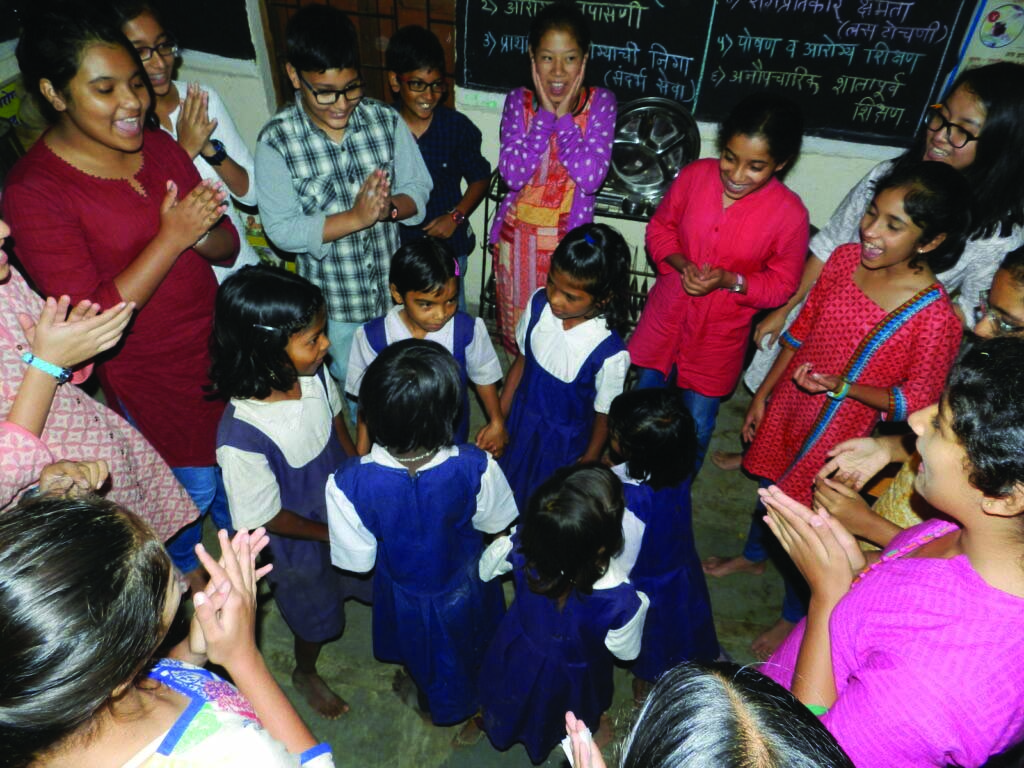
Rishi Valley students with government school children
Nevertheless, despite the excellent record of KFI Education Centres and schools in dispensing exemplary academic, co-curricular and ecology-sensitive primary-secondary education to several generations, not a few educationists tend to dismiss KFI as an alternative schooling experiment, unsuitable for scaling. Yet while it’s true that the number of students in KFI schools is very small — The School, KFI, Chennai with 380 children has the largest enrolment — the foundation’s trustees argue that enrolments are tightly controlled to maintain favourable teacher-pupil ratios and individual attention to students. They say that scale should be measured by the outreach and education initiatives of the foundation’s study centres.
“Over the past several decades, KFI’s community outreach programmes have benefited a large number of socio-economically disadvantaged rural citizens to whom the foundation has provided medical care, free-of-charge education for children and skilling and livelihood opportunities. For instance, over 200,000 government schools across the country have received aid, advice and upgradation inputs from our study centres which have also provided professional development training to 111,000 government school teachers. Moreover over the past 25 years our study centre professionals and teachers have invested 3,300 man-days assisting government school teachers to improve classroom teaching, and we provide highly subsidised medical treatment to 20,000 rural citizens every year. All these activities are conducted with the involvement of children in KFI schools, enabling them to learn-by-doing,” says Vishwanath Alluri, trustee-secretary of the foundation.
Even though with their insistence on highly-positive teacher-pupil ratios and individual attention to students, KFI schools are not replicable models for mass education, there’s no doubt they offer numerous best practices and pedagogies that deserve replication in K-12 education countrywide. The plain fudged truth is that learning outcomes in primary education — as testified by the Annual Status of Education Reports of the authoritative Pratham Education Foundation — are continuously declining, vocational education and training hasn’t got off the ground, teacher training quality is rock bottom and ranks awarded to India’s higher education institutions in the QS and THE World University Rankings is in the doldrums. This situation is likely to have worsened after the 82-week lockdown of all education institutions countrywide during the Covid-19 pandemic era.
As the country’s education institutions begin to regain post-pandemic momentum in a fractious era of religious and communal discord while suffering ravages of climate change, government and private educators would do well to revisit Krishnamurti’s education philosophy and teachings. While this philosopher-sage is no longer with us, his legacy lives on in the excellent schools and education centres promoted by him and administered by his heirs.
“JK’s teachings are universal & eternal”
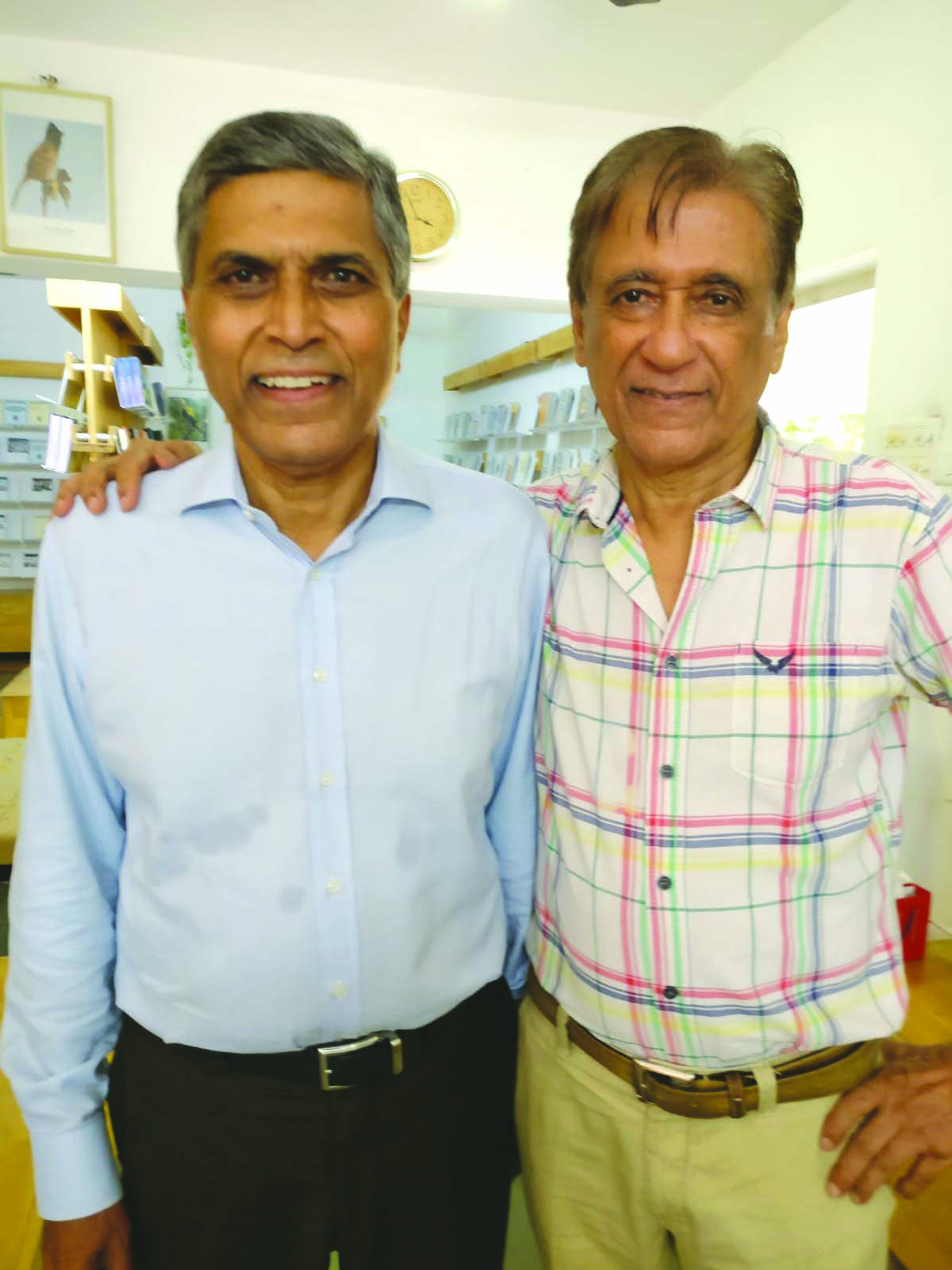
Alluri (left) with Dilip Thakore
Dilip Thakore interviewed Vishwanath Alluri, former technopreneur and currently trustee-secretary of the Krishnamurti Foundation India (KFI), on the foundation’s sylvan Vasant Vihar, Chennai campus where Krishnamurti delivered hundreds of discourses on the art of living and education. Excerpts from the 90-minute interview.
KFI was established 93 years ago. What are the aims and objectives for which the foundation was promoted?
KFI (formerly Foundation for New Education) was established in 1928 to publish and archive the teachings of Krishnaji. Soon after the foundation promoted the Rishi Valley School, a co-ed boarding school grounded in the teachings of Krishnaji. Since then the foundation has promoted the Rajghat Besant School, Varanasi (1934), The School KFI, Chennai (1973), The Valley School, Bangalore (1976), Sahyadri School, Pune (1995), and the Pathashaala, Vallipuram, near Chennai (2010) with an aggregate enrolment of 2,000 students mentored by 270 teachers. The number of children in every school is small because we accord high importance to individualised attention and healthy teacher-pupil ratios.
How satisfied are you that these aims and objectives have been attained?
There’s no end point in this process of keeping the schools grounded in Krishnaji’s teachings. It is a continuous journey and a way of living for all those involved in the work.
However, though a lot needs to be done, I believe that we are on the right path in terms of dissemination of his teachings. Despite the lesser attention span of current generation of children because of the distractions of the internet and popularity of the social media, KFI schools are doing well academically and in terms of learning to live in harmony with other children and with nature. In KFI’s education centres and schools, educators and students accord high importance to community outreach programmes such as enabling local communities and helping government schools to upgrade teaching-learning.
In many ways, JK was a pioneer path-breaking education philosopher. What would you say was the essence of his education philosophy?
Krishnaji’s teachings cover the whole field of existence. Education of children is an important part of his teachings and it is to provide holistic education that prepares children to develop into good human beings who live orderly lives. Conventional education is too academic and competitive and educators tend to ignore development of the inner self of children. Krishnaji taught that schools should be leisurely learning institutions where harmonious relationships with people and nature are built. Therefore, all KFI schools are set in flourishing nature-friendly environments. Initially established on barren despoiled land, our teachers and children have worked cooperatively to convert their campuses into flourishing bio-diverse ecosystems. Moreover all KFI schools have extensive neighbourhood and community development programmes which enable our students to learn by doing.
A criticism of KFI schools is that they are media shy and publicity averse and unwilling to share their best practices to improve the education system. To what extent if any, do you agree?
Admittedly we are somewhat media shy and averse to promotion of our schools for commercial purposes. However we have never been unwilling to share our best practices as evidenced by our extensive and continuous community betterment and outreach programmes that are integrated into the curriculums of KFI schools. We have trained thousands of government school teachers and others in our rural education methodology. Moreover, two years ago we introduced KFI’s online ‘Role of a Teacher in School’ programme under which for a modest fee we have trained 200 persons in batches of 60-70 to understand holistic learning grounded in Krishnaji’s teachings. This is an ongoing program with two batches being trained annually.
KFI schools don’t seem to have produced alumni who have made significant impact in politics, industry, arts and science. What’s your comment?
We don’t track the worldly success of our alumni. The objective of KFI schools is to develop our students into holistic individuals at peace with their inner selves, society and nature. Our schools have substantially attained this objective while simultaneously producing excellent academic results. This is because we recruit highly qualified and wholly committed teachers to implementing balanced, holistic learning grounded in Krishnaji’s teachings. Our educators ensure that their students learn to develop into introspective, reflective, compassionate human beings who live orderly lives and also succeed in their chosen vocations.
Looking ahead, what are the future growth and development plans of KFI?
To attract teachers who share the values and spirit of JK’s teachings. The trustees and institutional heads of KFI believe that JK’s teachings are universal and eternal. Instances and reports of man’s inhumanity to man are multiplying not only in India but around the world. Simultaneously, man-created ravages of environment despoliation and climate change are threatening the survival of humankind. We believe that Krishnaji’s teachings on education and the art of orderly living can light the path ahead.
J. Krishnamurti’s global impact
One of 11 (six survived childhood) children of Narayanaiah, a clerk employed by the Theosophical Society founded by British occultist and theosophist William Webster Leadbeater and Dr. Annie Besant (a founder of the Congress party) in Madras (latter day Chennai) in 1875, Jiddu Krishnamurti (JK) was discovered on the banks of River Adyar when he was an adolescent by Leadbeater who discerned in him the persona of a World Teacher who would lead the evolution of humankind. As such, he was educated and nurtured under the tutelage of Dr. Besant and members of the society.

Brockwood Park, UK. Inset: Antonio Autor
Although he never attended formal school or college, JK was undoubtedly extraordinarily gifted and reportedly learned to read and write fluent English in six months. Subsequently, privately tutored in England and widely acknowledged as a philosopher-seer, during his lifetime Krishnamurti delivered lectures on education, philosophy, introspection and meditation in Latin America, the US, UK and Europe detailing his world view and prescription for developing a peaceful, harmonious global society in a world recovering from two disastrous World Wars.
During his lecture tours, Krishnamurti’s message of inner self-development and co-existence with nature as the precondition of world peace and harmony between people and nations, attracted great attention, and schools, study centres and foundations propagating his philosophy and teachings were established worldwide.

Oak Grove School, Californi’a Jodi Grass
“The essence of JK’s message to educators and learners is that to know oneself in relationships should be a priority of education systems. Relationship with each other, with nature, with our bodies, the world, ideas and objects. In other words, with everything that touches our lives. In education, sustained and conscious enquiry into the nature of the self in relationships, invites the idea of freedom from conditioning and therefore ultimate liberation, something fundamental in understanding the universe. There is no difference between educators and learners, both are learning the art of living together as friends” says Antonio Autor, a graduate of the Bilbao School of Business (Spain), and currently managing-trustee of the Krishnamurti Foundation Trust, UK (estb.1968), which supports the Brockwood Park and Inwoods Small School (aggregate enrolment: 70 students mentored by 11 teachers) and Krishnamurti Study Centre, set on a three-acre campus in scenic Hampshire in southern England.
Krishnamurti’s education philosophy and teachings are also being kept alive in the US by the Krishnamurti Foundation of America (KFA, estb.1968) in Ojai, California, where this extraordinary philosopher-seer and teacher passed away in 1986. The foundation’s Ojai Education Centre and Oak Grove School sited on a 150-acre oak woodland campus was established in 1975 with the mission to “honour every student’s innate intelligence with the goal of realising human potential for the individual’s sake and the sake of humanity”.
“JK’s message which addresses the basic human experience is as alive and relevant today as it has ever been. His teachings suggest there is no way or blueprint to achieve our mission of honouring each student’s innate intelligence. We approach his intent, therefore, with openness and inquiry, opportunities for self-reflection, silence, pure observation, physical and psychological space, exploring our relationship with nature, ourselves, others and the world. All this could be seen as within the realm of understanding, as a way to awaken the individual child’s perfect intelligence,” says Jodi Grass, who brought 33 years’ experience with non-profits and schools when she came aboard KFA in 2005. Currently, she is the principal of the Oak Grove School, Ojai, California, which has 240 students and 71 teachers and staff on its muster rolls.
Thus spake Krishnamurti
“ Present-day education is a complete failure because it has over-emphasised technique. In over-emphasising technique we destroy man. To cultivate capacity and efficiency without understanding life, without having a comprehensive perception of the ways of thought and desire, will only make us increasingly ruthless, which is to engender wars and jeopardise our physical security.
• Education may have a different meaning altogether — not merely transferring what is printed on a page to your brain. Education may mean opening the doors of perception on to the vast movement of life. It may mean learning how to live happily, freely, without hate and confusion, but in beatitude. Modern education is blinding us; we learn to fight each other more and more, to compete, to struggle with each other. Right education is surely finding a different way of life, setting the mind free from its own conditioning.
• Teaching is the noblest profession — if it can be called a profession at all. It is an art that requires, not just intellectual attainments, but infinite patience and love. To be truly educated is to understand our relationship to all things — to money, to property, to people, to nature — in the vast field of our existence.
• When the industry of entertainment takes over, when the young people, the students, the children, are constantly instigated to pleasure, to romantic sensuality, the words ‘restraint’ and ‘austerity’ are pushed away.
• They want you to be mechanical, to fit in with tradition, to conform, to believe, to accept authority.
• Each generation revolts against the past generation and hands to the following generation a perfect mess, of war, hatred, division, brutality, violence, despair.
• To educate you so that you do not get caught in the whirlpool of existence but live in the whole river of life — that is the whole function of education.
• Right education is not to help you to find careers. It is to help you to find out for yourself what you really, with all your heart, love to do.
• We are facing a tremendous crisis which politicians can never solve. Nor can scientists understand or solve the crisis, nor yet the business world, the world of money. The turning point is not in politics, in religion, in the scientific world; it is in our consciousness.
• Take a leaf in the spring—how delicate it is, and yet it has extraordinary strength to stand the wind; in summer it matures and in autumn it turns yellow and then it dies. It is one of the most beautiful things to see. The whole thing is a movement of beauty, of the vulnerable. The leaf that is very, very tender, becomes rich, takes shape, meets summer, and then when autumn comes it turns gold. It is a perpetual movement from beauty to beauty. There is fullness in the spring leaf as well as in the dying leaf. Why cannot man live and die that way? Thus spake Krishnamurti ”
Also Read:12 uninterrupted rackets destroying Indian education
[/userpro_private]





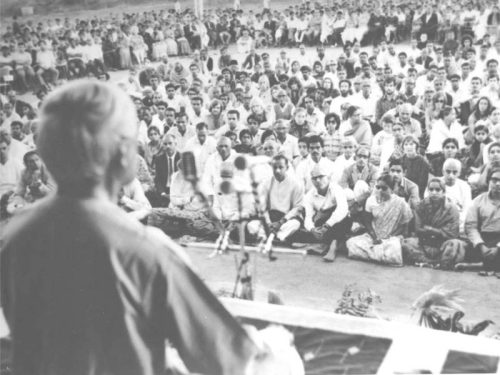










Add comment